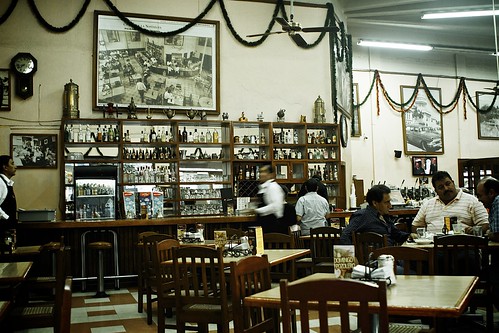Cafe La Habana, where according to legend, Fidel Castro, Che Guevara, and a group of Cuban exiles planned the Cuban Revolution to take down the Batista Dictatorship. It was also a favorite hangout of exiled Chilean writer Roberto Bolaño.
Over an Ethiopian dinner with friends @ethanz once observed that Darfur in the Western imagination is neither a conflict nor a region. It is a metaphor, a rorschach test for all our preconceived notions, complexes, and fragilities about race, religion and (to a lesser extent) autonomy.
Cuba, it seems to me, is even more of a metaphor, especially in the United States. But rather than race and religion, it has become a cheap punching bag for all our emotional and political baggage related to liberty and entrepreneurialism on the one hand and fraternity and equality on the other. We just can’t seem to treat it as a place with people who create culture.
One of the very few people I’ve met who does seem capable of discussing Cuba as a cultural geography is David Iaconangelo, who for the past two years has been quietly working away at translating modern Cuban short fiction into English.
While heavyweight American intellectuals cite dissident Yoaní Sanchez as if she were the modern incarnation of Václav Havel, David has been observing what I find to be a much more interesting and dare I say authentic trend: a culture of creative independence taking shape among young writers who gain unmediated access to each other’s work through the Cuban blogosphere.
David and I planned to meet at Cafe La Habana to discuss fairy tales. Okay, maybe that’s a bit of an exaggeration, but David has lately taken to reading Latin American fairy tales and I recently finished Borges’ Manual of Fantastic Zoology, a whimsical index of mythical creatures that never seem to leave the collective imagination at peace. Instead, as has been happening more frequently now that Mexico City is becoming less of an urban monster and more of a home, we ran into some friends. Inevitably we began discussing Cuba and inevitably it transformed into a metaphor.
But the big difference is that many of these friends had actually been to Cuba, unlike anyone I’ve ever met in the United States, eager to either romanticize or demonize what is just one of dozens of Caribbean islands. Why does Cuba command so much attention/obsession around the world? This was the subject of a two-part radio documentary by the BBC, Brand Cuba. Much of the second part of the documentary focuses on the presence of Cuban doctors in Pakistan, a story that went almost completely un-reported by mainstream media. Unsurprisingly, a leaked cable by Michael E. Parmly begins:
USINT is always looking for human interest stories and other news that shatters the myth of Cuban medical prowess, which has become a key feature of the regime’s foreign policy and its self-congratulatory propaganda.
Still, this was exactly the type of conversation I was hoping to avoid. It doesn’t go anywhere. And mostly we were able to.
Instead we discussed what incentivizes creativity. Does freedom or repression inspire art? Is government financial support of the arts a help or hindrance?
Why are Americans so ashamed of being identified as poets when it seems that every Mexican under 30 is a self-described Rimbaud? Later I found two interesting takes on the role of art in Cuban life – Cuba: The Art Revolution by Frontline and The Cuban Art Revolution by WSJ. It is fascinating to see how the support of art in Cuba shifted so suddenly from the state to the tourist.
It’s been more than seven years since I was last in Cuba. I’ve heard that the country has changed little and that it’s changed a lot. I’m sure both statements are grounded in truth. Back in 2003 I was sure that by now American citizens would have the right to travel where they want. Sadly I was wrong.
A couple months ago I documented a campaign by the Latin America Working Group to legalize travel to Cuba. They had made great strides and I was optimistic, but then the midterm elections came along and it looks like US citizens are further away from being able to legally visit Cuba then ever before. That’s not stopping most Americans, however. “More than 1,000 travelers from the United States are arriving every day in Cuba,” writes Marc Frank for Reuters.
I plan on returning soon and I would be happy to receive a $10,000 fine from the Treasury Department. Of course I would not pay it, as no American should. If the US government were then to throw a citizen in jail simply because of where he took his vacation … well, that would just about place them in the same boat as Cuba.

David Sasaki is the Director of Rising Voices, a global citizen media outreach initiative of Global Voices Online.
He manages a portfolio of small-scale projects around the developing world that use citizen media to effect social change.
Prior to his current focus on outreach, he served as Global Voices’
Latin America Regional Editor, monitoring the Latin American blogosphere, highlighting key content and translating select posts from Spanish to English.
Sasaki transitioned into online journalism after working as a freelance
web developer and English instructor in Monterrey, Mexico. He now splits his time and residence between North and Latin America and writes frequently at Rising Voices, Online. He manages a portfolio of small-scale projects around the developing world that use citizen media to effect social change.
Prior to his current focus on outreach, he served as Global Voices’
Latin America Regional Editor, monitoring the Latin American blogosphere, highlighting key content and translating select posts from Spanish to English.









